Enlarge Your Vocabulary - Adjectiv Suffix
- 格式:doc
- 大小:30.50 KB
- 文档页数:2
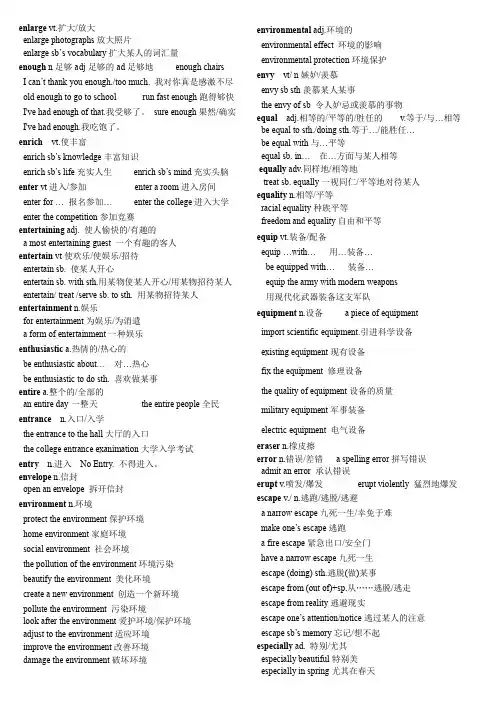
enlarge vt.扩大/放大enlarge photographs放大照片enlarge sb’s vocabulary扩大某人的词汇量enough n足够adj足够的ad足够地enough chairsI can’t thank you enough./too much. 我对你真是感激不尽old enough to go to school run fast enough跑得够快I've had enough of that.我受够了。
sure enough果然/确实I've had enough.我吃饱了。
enrich vt.使丰富enrich sb’s knowledge丰富知识enrich sb’s life充实人生enrich sb’s mind充实头脑enter vt进入/参加enter a room进入房间enter for …报名参加…enter the college进入大学enter the competition参加竞赛entertaining adj. 使人愉快的/有趣的a most entertaining guest 一个有趣的客人entertain vt使欢乐/使娱乐/招待entertain sb. 使某人开心entertain sb. with sth.用某物使某人开心/用某物招待某人entertain/ treat /serve sb. to sth. 用某物招待某人entertainment n.娱乐for entertainment为娱乐/为消遣a form of entertainment一种娱乐enthusiastic a.热情的/热心的be enthusiastic about…对…热心be enthusiastic to do sth. 喜欢做某事entire a.整个的/全部的an entire day 一整天the entire people全民entrance n.入口/入学the entrance to the hall大厅的入口the college entrance exanimation大学入学考试entry n.进入No Entry. 不得进入。

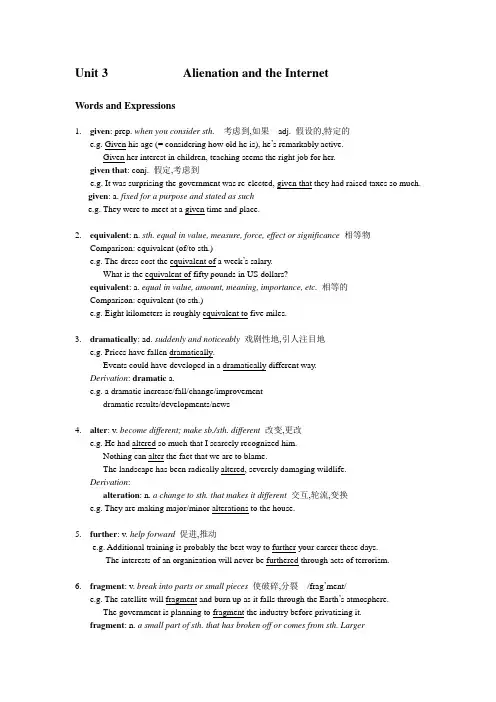
Unit 3 Alienation and the InternetWords and Expressions1.given: prep. when you consider sth. 考虑到,如果adj. 假设的,特定的e.g. Given his age (= considering how old he is), he’s remarkably active.Given her interest in children, teaching seems the right job for her.given that: conj. 假定,考虑到e.g. It was surprising the government was re-elected, given that they had raised taxes so much.given: a. fixed for a purpose and stated as suche.g. They were to meet at a given time and place.2.equivalent: n. sth. equal in value, measure, force, effect or significance 相等物Comparison: equivalent (of/to sth.)e.g. The dress cost the equivalent of a week’s salary.What is the equivalent of fifty pounds in US dollars?equivalent: a. equal in value, amount, meaning, importance, etc. 相等的Comparison: equivalent (to sth.)e.g. Eight kilometers is roughly equivalent to five miles.3.dramatically: ad. suddenly and noticeably 戏剧性地,引人注目地e.g. Prices have fallen dramatically.Events could have developed in a dramatically different way.Derivation: dramatic a.e.g. a dramatic increase/fall/change/improvementdramatic results/developments/news4.alter: v. become different; make sb./sth. different 改变,更改e.g. He had altered so much that I scarcely recognized him.Nothing can alter the fact that we are to blame.The landscape has been radically altered, severely damaging wildlife.Derivation:alteration: n. a change to sth. that makes it different 交互,轮流,变换e.g. They are making major/minor alterations to the house.5.further: v. help forward 促进,推动e.g. Additional training is probably the best way to further your career these days.The interests of an organization will never be furthered through acts of terrorism.6.fragment: v. break into parts or small pieces 使破碎,分裂/frag’ment/e.g. The satellite will fragment and burn up as it falls through the Earth’s atmosphere.The government is planning to fragment the industry before privatizing it.fragment: n. a small part of sth. that has broken off or comes from sth. Largere.g. Police found fragments of glass near the scene.I overheard a fragment of their conversation.Pronunciation:Note that when the same form is used as a noun, the stress shifts to the first syllable.Derivation:fragmentation n. 分裂e.g. the fragmentation of the country into small independent statesfragmented a. 成碎片的,片段的e.g. a fragmented society7.alienate: v. cause sb. to feel very distant from or not welcome to sb. else 使疏远,离间,麻木e.g. She was alienated from her brother by her foolish behavior.All these changes to the newspaper have alienated its traditional readers.Derivations:alien: a. & n. 外国的,陌生的;外星人e.g. In a world that had suddenly become alien and dangerous, he was her only security.aliens from outer space (n.)alienation: n. 疏远,离间,[哲]异化e.g. The new policy resulted in the alienation of many voters.Many immigrants suffer from a sense of alienation.8.addicted: a. being dependent on sth. and wanting to spend as much time doing it as possibleCollocation:be addicted to sth.e.g. Some youngsters are hopelessly addicted to video games.She’s become addicted to love stories.Derivations:addiction: n. 沉溺,上瘾e.g. He is now fighting his addiction to alcohol.addictive: a. 使人上瘾的e.g. Heroin is highly addictive.9.alcoholic: n. sb. who cannot stop drinking large amounts of alcohol, even when this is makinghim/her ill 酗酒者Word Formation:-aholic: (suffix in nouns) liking sth. very much and unable to stop doing or using ite.g. shopaholic; chocaholic; workaholic 购物狂;巧克力迷;工作狂10.in that: conj. (formal) for the reason that; because 因为e.g. She was fortunate in that she had friends to help her.Men differ from brutes in that they can think and speak.The news was all the more reliable in that it was from an official source.11.be given to: (formal) so sth. often or regularlyCollocation:e.g. The evidence against him was overwhelming.She had the almost overwhelming desire to tell him the truth.Derivation:be given to sth. / doing sth.e.g. He is given to heavy drinking.He is given to going for long walk on his own.12.exaggeration: n. continue in a course of action even in the face of difficulty or with little or noindication of success 夸张e.g. He told his story simply and without exaggeration.Derivations:exaggerate: v. make sth. seem larger, better, worse or more important than it really ise.g. The hotel was really filthy and I’m not exaggerating.He tends to exaggerate the difficulties.13.binge: n. an occasion when an activity is done in an extreme way, esp. eating, drinking orspending money 狂欢,作乐e.g. go on a binge / an Internet binge / a chocolate bingeOne of the symptoms of this disease is binge eating.14.skew: v. cause to be not straight or exact; twist 歪斜,扭转e.g. The company’s results for this year are skewed because not all our customers have paidtheir bills.Today’s election will skew the results in favor of the northern end of the country.ment: v. express sadness and regret about sth. 惋惜,哀悼e.g. He lamented the death of his friend.She lamented that she had never been to Paris.Derivation:lamentable: a. very disappointing 可悲的,哀伤的,可怜的e.g. She shows a lamentable lack of understanding.16.… it struck us that …: … it occurred to us that … / … we suddenly realized that …e.g. How does the concert last night strike you?He struck me as an odd, old-fashioned professor of Chinese.17.confront: 面对,遭遇(1)v. deal with a problem or difficult situationSynonym:face up to 大胆面对,勇于正视e.g. She knew that she had to confront her fears.He manifested extraordinary courage when confronted with formidable difficulty.(2) face sb. so that they cannot avoid seeing and hearing you, esp. in an unfriendly ordangerous situatione.g. The lawyer confronted the accused man with the forged check.This was the first time he had confronted an armed robber.18.perceive: v. see, notice, or realize sth., esp. when it is not obvious 注意到,察觉到,认为e.g. I perceived a change in his behavior.She perceived that all was not well.The patient was perceived to have difficulty in breathing.Derivations:perception: n. 观念,洞察力,认识能力perceptive: a. having or showing the ability to see or understand things quickly, esp.things that are not obvious 敏感的,有洞察力的,感知的e.g. It was very perceptive of you to notice that.perceptible: a. great enough for you to notice it (Synonym: noticeable) 可察觉的,能感觉到的e.g. Her foreign accent was barely perceptible.19.converse: n. the opposite 相反的e.g. In the U.S., cars are driven on the right side of the road, but in Britain the converseapplies.It is possible, of course, that the converse of this theory may also be true.20.maximize:(1) v. increase sth. as much as possiblee.g. maximize efficiency/fitness/profits[computing] Maximize the window to full screen.(2)v. make the best use of sth.e.g. maximize opportunities/resourcesAntonym: minimizeVocabulary ExercisesIII. Word Derivation1.alienation n. → alienate v.(1)制造业的工作又枯燥又单调,使许多工人产生了一种疏离感。
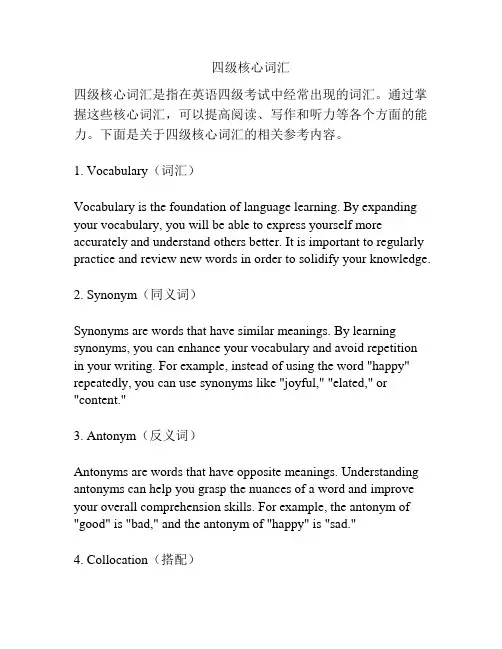
四级核心词汇四级核心词汇是指在英语四级考试中经常出现的词汇。
通过掌握这些核心词汇,可以提高阅读、写作和听力等各个方面的能力。
下面是关于四级核心词汇的相关参考内容。
1. Vocabulary(词汇)Vocabulary is the foundation of language learning. By expanding your vocabulary, you will be able to express yourself more accurately and understand others better. It is important to regularly practice and review new words in order to solidify your knowledge.2. Synonym(同义词)Synonyms are words that have similar meanings. By learning synonyms, you can enhance your vocabulary and avoid repetition in your writing. For example, instead of using the word "happy" repeatedly, you can use synonyms like "joyful," "elated," or "content."3. Antonym(反义词)Antonyms are words that have opposite meanings. Understanding antonyms can help you grasp the nuances of a word and improve your overall comprehension skills. For example, the antonym of "good" is "bad," and the antonym of "happy" is "sad."4. Collocation(搭配)Collocation refers to the arrangement or combination of words that often go together. Mastering collocations can make your English more natural and fluent. For example, we say "make a decision" instead of "do a decision," and "take a shower" instead of "have a shower."5. Idioms(习语)Idioms are phrases or expressions that do not have a literal meaning. Learning idioms can help you understand and communicate in a more native-like way. For example, "a piece of cake" means something is very easy, and "break a leg" is a way to wish someone good luck.6. Phrasal Verbs(短语动词)Phrasal verbs are combinations of verbs and prepositions or adverbs that have a different meaning from the individual words. Phrasal verbs are commonly used in spoken English and understanding them is essential for effective communication. For example, "give up" means to stop doing something, and "take off" means to remove or start to fly.7. Prefixes and Suffixes(前缀和后缀)Prefixes are added at the beginning of a word, and suffixes are added at the end of a word to change its meaning. Understanding common prefixes and suffixes can help you deduce the meaning of unfamiliar words. For example, "un-" is a prefix that means "not," as in "unhappy," and "-ful" is a suffix that means "full of," as in"grateful."8. Academic Words(学术词汇)Academic words are vocabulary words that are frequently used in academic or formal contexts. These words often appear in reading passages, essay prompts, and lecture materials in academic settings. Examples of academic words include "analyze," "evaluate," "interpret," and "demonstrate."9. Word Families(词族)Word families are groups of words that are derived from the same root word and share a common meaning or pattern. By understanding and studying word families, you can expand your vocabulary efficiently. For example, the word family for "inform" includes words like "informative," "information," and "misinform."10. Context Clues(上下文线索)Context clues are hints or information in the surrounding words or sentences that help you figure out the meaning of an unknown word. Being able to use context clues effectively is a valuable skill in reading comprehension. Context clues can be provided through synonyms, antonyms, examples, or explanations within the text.In conclusion, mastering the four-level core vocabulary is crucial for success in the English language proficiency test. By focusing on vocabulary, synonyms, antonyms, collocations, idioms, phrasal verbs, prefixes, suffixes, academic words, word families, andcontext clues, students can enhance their language skills and achieve better results in the four-level examination.。
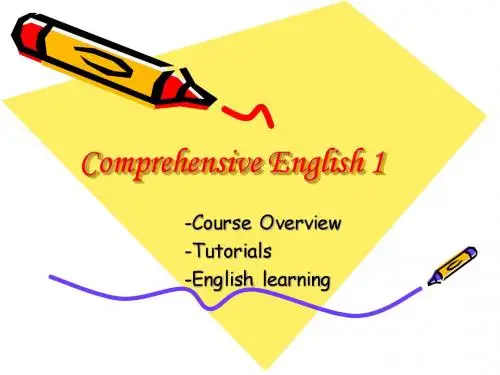
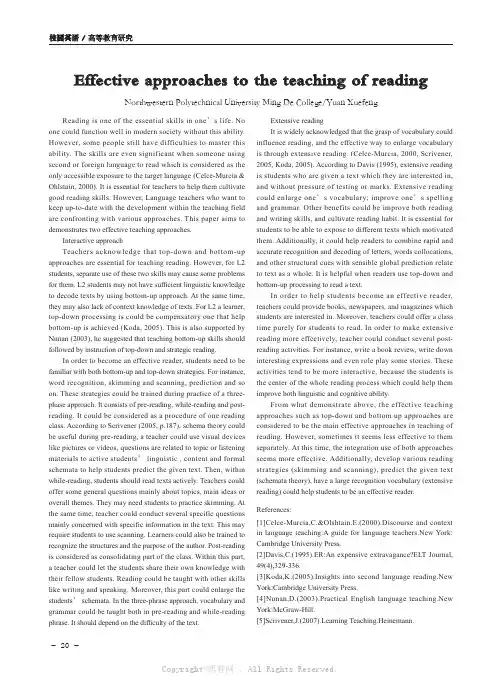
- 20-校园英语 / 高等教育研究Effective approaches to the teaching of reading Northwestern Polytechnical University Ming De College/Yuan XuefengReading is one of the essential skills in one’s life. No one could function well in modern society without this ability. However, some people still have difficulties to master this ability. The skills are even significant when someone using second or foreign language to read which is considered as the only accessible exposure to the target language (Celce-Murcia & Ohlstain, 2000). It is essential for teachers to help them cultivate good reading skills. However, Language teachers who want to keep up-to-date with the development within the teaching field are confronting with various approaches. This paper aims to demonstrates two effective teaching approaches.Interactive approachTeachers acknowledge that top-down and bottom-up approaches are essential for teaching reading. However, for L2 students, separate use of these two skills may cause some problems for them. L2 students may not have sufficient linguistic knowledge to decode texts by using bottom-up approach. At the same time, they may also lack of context knowledge of texts. For L2 a learner, top-down processing is could be compensatory one that help bottom-up is achieved (Koda, 2005). This is also supported by Nunan (2003), he suggested that teaching bottom-up skills should followed by instruction of top-down and strategic reading.In order to become an effective reader, students need to be familiar with both bottom-up and top-down strategies. For instance, word recognition, skimming and scanning, prediction and so on. These strategies could be trained during practice of a three-phase approach. It consists of pre-reading, while-reading and post-reading. It could be considered as a procedure of one reading class. According to Scrivener (2005, p.187), schema theory could be useful during pre-reading, a teacher could use visual devices like pictures or videos, questions are related to topic or listening materials to active students’ linguistic , content and formal schemata to help students predict the given text. Then, within while-reading, students should read texts actively. Teachers could offer some general questions mainly about topics, main ideas or overall themes. They may need students to practice skimming. At the same time, teacher could conduct several specific questions mainly concerned with specific information in the text. This may require students to use scanning. Learners could also be trained to recognize the structures and the purpose of the author. Post-reading is considered as consolidating part of the class. Within this part, a teacher could let the students share their own knowledge with their fellow students. Reading could be taught with other skills like writing and speaking. Moreover, this part could enlarge the students’ schemata. In the three-phrase approach, vocabulary and grammar could be taught both in pre-reading and while-reading phrase. It should depend on the difficulty of the text.Extensive readingIt is widely acknowledged that the grasp of vocabulary could influence reading, and the effective way to enlarge vocabulary is through extensive reading. (Celce-Murcia, 2000, Scrivener, 2005, Koda, 2005). According to Davis (1995), extensive reading is students who are given a text which they are interested in, and without pressure of testing or marks. Extensive reading could enlarge one’s vocabulary; improve one’s spelling and grammar. Other benefits could be improve both reading and writing skills, and cultivate reading habit. It is essential for students to be able to expose to different texts which motivated them. Additionally, it could help readers to combine rapid and accurate recognition and decoding of letters, words collocations, and other structural cues with sensible global prediction relate to text as a whole. It is helpful when readers use top-down and bottom-up processing to read a text.In order to help students become an effective reader, teachers could provide books, newspapers, and magazines which students are interested in. Moreover, teachers could offer a class time purely for students to read. In order to make extensive reading more effectively, teacher could conduct several post-reading activities. For instance, write a book review, write down interesting expressions and even role play some stories. These activities tend to be more interactive, because the students is the center of the whole reading process which could help them improve both linguistic and cognitive ability.From what demonstrate above, the effective teaching approaches such as top-down and bottom up approaches are considered to be the main effective approaches in teaching of reading. However, sometimes it seems less effective to them separately. At this time, the integration use of both approaches seems more effective. Additionally, develop various reading strategies (skimming and scanning), predict the given text (schemata theory), have a large recognition vocabulary (extensive reading) could help students to be an effective reader. References:[1]Celce-Murcia,C.&Olshtain.E.(2000).Discourse and context in language teaching:A guide for language teachers.New York: Cambridge University Press.[2]Davis,C.(1995).ER:An expensive extravagance?ELT Journal, 49(4),329-336.[3]Koda,K.(2005).Insights into second language reading.New York:Cambridge University Press.[4]Nunan,D.(2003).Practical English language teaching.New York:McGraw-Hill.[5]Scrivener,J.(2007).Learning Teaching.Heinemann.Copyright©博看网 . All Rights Reserved.。

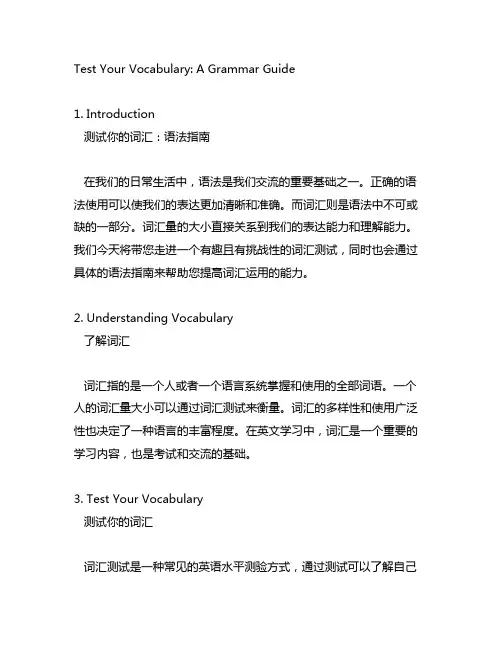
Test Your Vocabulary: A Grammar Guide1. Introduction测试你的词汇:语法指南在我们的日常生活中,语法是我们交流的重要基础之一。
正确的语法使用可以使我们的表达更加清晰和准确。
而词汇则是语法中不可或缺的一部分。
词汇量的大小直接关系到我们的表达能力和理解能力。
我们今天将带您走进一个有趣且有挑战性的词汇测试,同时也会通过具体的语法指南来帮助您提高词汇运用的能力。
2. Understanding Vocabulary了解词汇词汇指的是一个人或者一个语言系统掌握和使用的全部词语。
一个人的词汇量大小可以通过词汇测试来衡量。
词汇的多样性和使用广泛性也决定了一种语言的丰富程度。
在英文学习中,词汇是一个重要的学习内容,也是考试和交流的基础。
3. Test Your Vocabulary测试你的词汇词汇测试是一种常见的英语水平测验方式,通过测试可以了解自己的词汇量,同时也可以帮助自己在学习中不断扩充词汇。
通过不同难度级别的测试题,您可以对自己的词汇量进行全面的检测,从而找出不足之处并加以弥补。
4. Grammar Guide for Vocabulary词汇的语法指南除了词汇量的大小之外,词汇的使用也需要遵循一定的语法规则。
正确的语法使用可以使词汇的表达更加准确和清晰。
我们为您准备了一份针对常见语法问题的指南,希望能够帮助您更好地运用词汇。
5. Nouns and Pronouns名词和代词名词和代词是语言中常见的词类,它们用来表示人、事物、地点等。
在使用名词和代词时需要注意单复数的变化、所有格的表达以及人称代词的使用等问题。
正确地运用名词和代词可以使句子结构更加完整。
6. Verbs and Tenses动词和时态动词是句子中最基本的成分之一,它用来表示动作、状态或者是存在。
在使用动词时需要注意时态的运用、情态动词的使用以及动词的不规则变化等问题。
正确地运用动词可以使句子的逻辑性更加清晰。
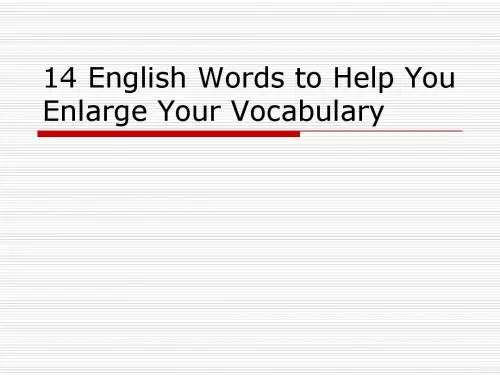
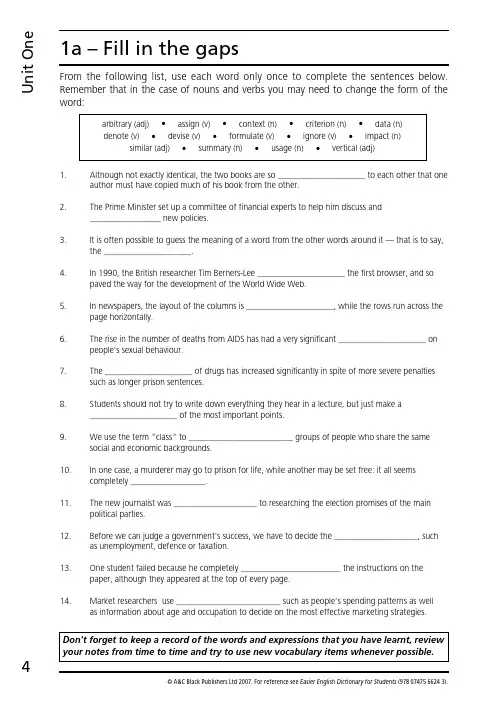
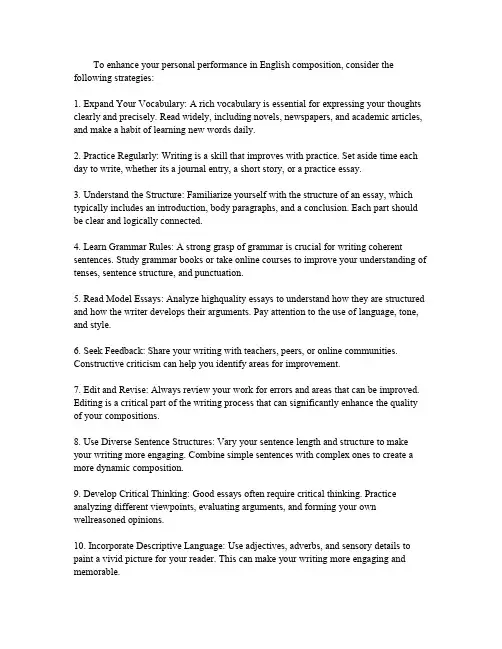
To enhance your personal performance in English composition,consider the following strategies:1.Expand Your Vocabulary:A rich vocabulary is essential for expressing your thoughts clearly and precisely.Read widely,including novels,newspapers,and academic articles, and make a habit of learning new words daily.2.Practice Regularly:Writing is a skill that improves with practice.Set aside time each day to write,whether its a journal entry,a short story,or a practice essay.3.Understand the Structure:Familiarize yourself with the structure of an essay,which typically includes an introduction,body paragraphs,and a conclusion.Each part should be clear and logically connected.4.Learn Grammar Rules:A strong grasp of grammar is crucial for writing coherent sentences.Study grammar books or take online courses to improve your understanding of tenses,sentence structure,and punctuation.5.Read Model Essays:Analyze highquality essays to understand how they are structured and how the writer develops their arguments.Pay attention to the use of language,tone, and style.6.Seek Feedback:Share your writing with teachers,peers,or online communities. Constructive criticism can help you identify areas for improvement.7.Edit and Revise:Always review your work for errors and areas that can be improved. Editing is a critical part of the writing process that can significantly enhance the quality of your compositions.e Diverse Sentence Structures:Vary your sentence length and structure to make your writing more bine simple sentences with complex ones to create a more dynamic composition.9.Develop Critical Thinking:Good essays often require critical thinking.Practice analyzing different viewpoints,evaluating arguments,and forming your own wellreasoned opinions.10.Incorporate Descriptive Language:Use adjectives,adverbs,and sensory details to paint a vivid picture for your reader.This can make your writing more engaging and memorable.11.Stay Updated with Current Affairs:Being knowledgeable about current events can provide you with relevant examples and topics for your essays.e Technology:Utilize writing tools and apps that can help with grammar checks, vocabulary suggestions,and even writing prompts.13.Set Personal Goals:Establish specific,measurable goals for your writing,such as improving your vocabulary size or reducing grammatical errors.14.Participate in Writing Workshops:Joining a writing workshop can provide you with a supportive environment to share your work and learn from others.15.Imitate the Style of Writers You Admire:Study the writing style of authors you enjoy and try to incorporate elements of their style into your own work.By implementing these strategies,you can gradually improve your English composition skills and achieve higher personal scores in your writing assessments.。
增强词汇英语作文模板Enhancing Vocabulary in English Writing。
Vocabulary plays a crucial role in English writing. A rich and varied vocabulary not only makes your writing more interesting and engaging, but also allows you to express your ideas more precisely and effectively. In this article, we will explore some effective strategies for enhancing your vocabulary in English writing.1. Read Widely and Actively。
One of the best ways to expand your vocabulary is to read widely and actively. By exposing yourself to a wide range of written materials, such as books, newspapers, magazines, and online articles, you will come across new words and phrases that you can add to your vocabulary. It is important to read actively, which means paying attention to unfamiliar words and looking up their meanings. You can also keep a vocabulary journal to record new words and review them regularly.2. Learn Word Roots, Prefixes, and Suffixes。
英语学习中的词汇扩充建议Introduction:In the process of English language acquisition, expanding vocabulary is key to improving fluency and comprehension. This article aims to provide practical advice on how to effectively expand one's vocabulary.1. Reading extensively:Reading extensively is a valuable way to enhance vocabulary. Choose a wide range of reading materials, such as books, newspapers, journals, and online articles. Read across different genres to expose yourself to diverse vocabulary in various contexts. Begin with materials at your current proficiency level and gradually challenge yourself with more advanced texts. Whenever you encounter unfamiliar words, look them up in a dictionary and note down their meanings and usage.2. Contextual learning:Learning new vocabulary in context is highly effective. Rather than memorizing isolated words, try to understand how they are used in sentences or phrases. When encountering new words while reading, pay attention to the surrounding words and phrases that provide clues to their meanings. Look for synonyms, antonyms, or explanations within the text to assist in understanding the vocabulary in context. Making connections between words and their contexts enhances comprehension and aids in retention.3. Vocabulary-building exercises:Engage in vocabulary-building exercises to actively practice and reinforce new words. Flashcards are an excellent tool for memorization. Create flashcards with words on one side and their definitions, synonyms, antonyms, or sample sentences on the other. Flip through them regularly, testing yourself on the meanings and usage of the words. Additionally, online resources and mobile applications offer a variety of vocabulary-building exercises, such as word games, quizzes, and puzzles, which make learning more interactive and enjoyable.4. Word associations:Creating word associations can facilitate memory retention. When encountering new words, try to connect them with words you already know or find similarities to other languages. For example, associating the word "philanthropy" with "philosophy" can help remember its meaning. You may also group related words together, forming semantic connections that aid in recall. Practice using these associated words in sentences or short conversations to reinforce your understanding and usage.5. Vocabulary journals:Maintaining a vocabulary journal is a practical way to record and review new words. Use a notebook or an electronic document to write down new words, their definitions, and example sentences. Make it a habit to review this journal regularly. You can organize the entries alphabetically or thematically, creating a personalized resource for future reference. Adding notes on word usage, collocations, and related expressions will further deepen your understanding.6. Language exchange and conversation practice:Engaging in language exchange programs or conversing with native speakers is an excellent method to learn new vocabulary. Exposing yourself to authentic conversations enables you to observe words in real-life contexts. Seek opportunities to engage in conversations with native English speakers, either through language exchange platforms, online forums, or local language clubs. Actively participate in discussions, asking for explanations or clarification when encountering unfamiliar words or phrases. Engaging in conversations also helps solidify word usage and pronunciation.Conclusion:Expanding vocabulary is an essential aspect of English language learning. By reading extensively, learning in context, practicing vocabulary-building exercises, creating associations, maintaining vocabulary journals, and engaging in conversation practice, learners can enhance their vocabulary proficiency effectively. Consistent practice and exposure are key to successful vocabulary expansion. Keep motivated and make learning new words a daily habit.。
掌握四级高频词汇写作不再是难题In recent years, English language proficiency has become increasingly important in our globalized world. One crucial aspect of English proficiency is the ability to effectively use high-frequency vocabulary in writing. For students preparing to take the College English Test Band 4 (CET-4), mastering these words can often be a challenging task. In this article, we will explore some strategies to help students overcome the difficulties in using high-frequency words in their writing.1. Understand the Meaning and Usage of High-Frequency WordsBefore attempting to use high-frequency words in writing, it is essential to have a clear understanding of their meanings and appropriate usage. Consider creating a vocabulary list with the selected high-frequency words along with their definitions and example sentences. This will serve as a handy reference tool while writing and help reinforce the understanding of these words.2. Read Widely to Enhance Vocabulary AcquisitionOne of the most effective ways to expand one's vocabulary is through extensive reading. Choose a variety of English materials, such as newspapers, magazines, and books, to expose yourself to a wide range of vocabulary. While reading, make a note of any unfamiliar words and their usage in context. Look up these words in a dictionary and try to incorporate them into your own writing.3. Utilize High-Frequency Words in Practice WritingRegular practice is crucial to develop proficiency in using high-frequency words. Set aside dedicated time for writing practice, focusing on incorporating these words into your compositions. Start with simple sentences and gradually increase the complexity as you become more comfortable with the vocabulary. Consider seeking feedback from teachers or peers to improve your writing skills further.4. Use Vocabulary Exercises and Online ResourcesSeveral online platforms and resources are available to help students review and practice high-frequency words. Online exercises, flashcards, and word games can be valuable tools in reinforcing vocabulary acquisition. Additionally, many websites offer word lists specifically designed for CET-4 test-takers. Take advantage of these resources to enhance your understanding and retention of high-frequency words.5. Contextualize the Words in Your WritingMere memorization of high-frequency words is not enough; it is equally important to understand how to use these words appropriately in written expressions. Make an effort to incorporate these words in a contextually relevant manner. This not only showcases your command of vocabulary but also enhances the clarity and coherence of your writing.6. Think in English and Practice SynonymsTo further improve your writing skills, it is essential to think in English rather than translating from your native language. Engage in activities that encourage active thinking and expression in English, such as speaking, writing, and even inner monologues. Additionally, practicing synonyms forhigh-frequency words enables you to diversify your vocabulary and adds nuance to your writing.ConclusionMastering high-frequency vocabulary in writing is indeed a challenging task, but with consistent effort and practice, it can be achieved. Understanding the meaning and usage of words, reading extensively, utilizing online resources, and contextualizing words in writing are effective strategies to overcome this obstacle. By actively incorporating high-frequency words into your writing and thinking in English, you will gradually enhance your ability to craft well-written compositions. With time and persistence, writing with high-frequency words will no longer be a daunting task, but rather a skill you possess with confidence.。
ivyenglish 背出你的好英文时文篇Ivyenglish—Recite Your Good EnglishIn the modern world, English has become a global language that bridges cultures, connects people, and opens up a world of opportunities. For non-native English speakers, mastering this language is not only a valuable skill but also a powerful tool for personal and professional growth. With the rise of online language learning platforms, such as Ivyenglish, individuals now have access to a wide range of resources and tools to improve their English proficiency.Ivyenglish is a leading online platform that offers English language courses, tutorials, and study materials for individuals of all ages and proficiency levels. With a team of experienced teachers and language experts, Ivyenglish provides high-quality education in a convenient and flexible format. Students can access lessons and practice materials anytime, anywhere, allowing them to learn at their own pace and according to their own schedule.One of the key features of Ivyenglish is its focus on recitation. Reciting passages of text, either aloud or silently, is a powerful technique for language learners to improve their pronunciation,fluency, and overall comprehension of the English language. By reciting and repeating words, phrases, and sentences, students can develop muscle memory and increase their ability to speak and understand English with greater ease and accuracy.In addition to recitation, Ivyenglish also offers a variety of interactive activities and exercises to help students reinforce their learning. From vocabulary quizzes and grammar exercises to listening comprehension tasks and speaking practice, Ivyenglish provides a comprehensive learning experience that covers all aspects of language acquisition. By engaging with these diverse activities, students can build their confidence, expand their vocabulary, and enhance their communication skills in English.Furthermore, Ivyenglish encourages students to participate in virtual language exchanges and conversations with native English speakers. Through live video chats and group discussions, students can practice their speaking and listening skills in a natural and authentic setting. By interacting with real people and engaging in meaningful conversations, students can improve their conversational fluency, cultural awareness, and confidence in using the English language.In conclusion, Ivyenglish offers a dynamic and effective approach to learning English that emphasizes recitation, practice, and real-world application. By combining innovative teaching methods with interactive technologies, Ivyenglish empowers students to recite their good English, strengthen their language skills, and achieve their goals in language proficiency. Whether you are a beginner or an advanced learner, Ivyenglish provides the tools and support you need to succeed in mastering the English language and unlocking a world of opportunities. Recite your good English with Ivyenglish and embark on a journey of language learning and personal growth.。
Enlarge Your V ocabulary
-Adjective Suffix
Grouchy (n + y)
-y (充满、有…性质,有…倾向)
bloody, greedy, dreamy, cloudy
Halting (halt + ing)
- ing, (v - n)
trying, lasting, astonishing
Thoughtless
- less (not)
aimless, helpless, restless
1.-able, - ible (有能力、易做、适合、足以)
Available(可得到的), changeable, innumerable, incredible
2. –al, -ial (性质)
federal; mortal; oriental; occidental; punctual
3.-an, -ian, -ese (人)
European, Parisian, Egyptian, veteran,
Chinese, Portuguese
4, -ant, -ent
radiant, defiant, fluent, proficient(熟练的)
5, -ar
Circular(圆形的), muscular(肌肉的,强壮的), polar(两级的), vulgar
6, -ary
Elementary(初级的), imaginary(想象的), temporary(临时的)
7, -ate, ete, ute (性质)
accurate(准确的), affectionate, considerate
8, -ed (具有、充满之意)
ringed(结婚的), aged, bearded, crowned(有皇冠的,皇室的),
9, -en (由…做成)
wooden, brazen(铜制的), earthen(土制的), leaden
lengthen, heighten, broaden,
10, -ern (方向)
northern, modern, western
11. –fold (倍数)
manifold(多倍的), twofold, tenfold, twentyfold, hundredfold
12, - ful (充满)
dreadful(恐怖的), fruitful, shameful, graceful
13, - ic, -ical (与…有关的, …性质的)
diplomatic(外交的), carbonic, zoological,
historic, historical,
economic, economical
14, - id
placid, stupid, rapid, timid, vivid.
15,- ile (易于…)
fertile (容易结果的=多产的), versatile (vers =转,经常转动=多才多艺的)
16, - ine (具有…性格)
feminine(具有女性气质的), genuine, masculine
17, -ior (具有比较性质的形容词)
inferior, superior,
junior, senior
18 - ique, esque (…风格的) (Stress)
antique (ante + ique) 古老的
arabesque (arab+esque) 阿拉伯式的
picturesque 如画的
19, -like (像…一样的)
businesslike, childlike, ladylike, womanlike
20, -most (最高级)
foremost (走在最前面的=最重要的), innermost, utmost (ut=out,最远的)
21, - ward (朝…方向)
backward, downward, eastward, homeward。